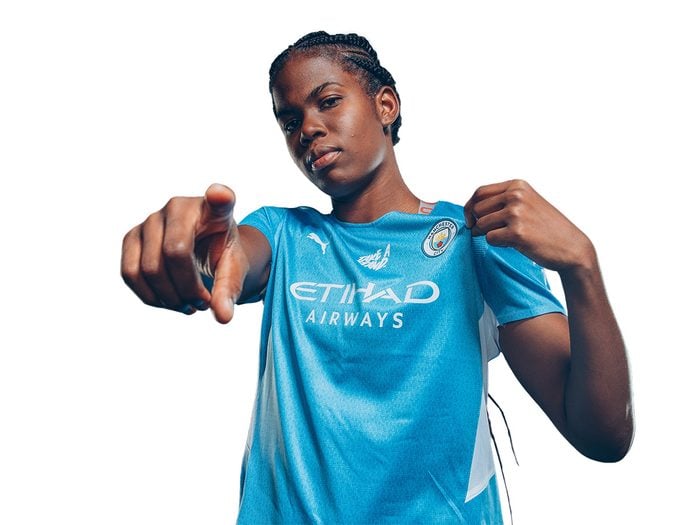
Khadija “Bunny” Shaw, 26, striker for Jamaica
Bunny Shaw collects all the old soccer boots her Manchester City teammates don’t want. “They call me the ‘Cleats Truck,’” says the striker, laughing. Jamaica’s top goal scorer of all time—in the men’s and the women’s game—can easily afford any boots she wants, but as a young girl she had to play in her school shoes. She knows that many young Jamaicans don’t have money for cleats, so whenever she goes back to the island, she presents those top-quality secondhand boots as prizes in local female soccer competitions.
Born in 1997 in Spanish Town, not far from the capital, Kingston, Khadija Shaw was the youngest of 13 children. One of her older brothers nicknamed her “Bunny” after her love of carrots. She loved watching him play soccer on the street outside their home. “A lot of people would gather and bet on who was going to win,” Shaw recalls. “I thought, I want to be a part of that!” So the boys started her off in goal.
Her parents weren’t happy. Her father, a shoemaker, and her mother, a poultry farmer, prized education for their kids. Her mother in particular thought soccer was a waste of time. In Jamaica there were no girls’ or women’s teams, “but I wanted to play football,” says Shaw, who had a World Cup poster on her wall and dreamed of competing in the sport’s greatest tournament.
So she’d play while her mother was out at the market. After she was caught, she turned to negotiating—“If I wash the dishes, can I go out and play?”—until she was selected at age 14 for Jamaica Under 15s. Her father convinced Bunny’s reluctant mother that it would be a valuable experience.

Bunny Shaw was on her way. She made the national team in 2015 and got a soccer scholarship at the University of Tennessee, where she earned a degree in communications, becoming the first person in her family to graduate from university.
When the Reggae Girlz, as the Jamaican national team is dubbed, qualified for the 2019 Women’s World Cup after beating Panama in a penalty shootout, Shaw’s dream had come true. It was a first for any Caribbean country.
Though Jamaica would go on to be eliminated in the group stage of the World Cup, qualifying was unforgettable. “I just knelt down on the pitch, and everyone was running around going crazy!” she recalls.
Shaw will be going with the Reggae Girlz to her second World Cup this summer. “When I look back on where I was then and where I am now, I’m proud of myself,” says Jamaica’s all-time top goal scorer.
Her advice to anyone with an impossible dream? “Failure is not permanent. Keep pushing, keep working hard.”
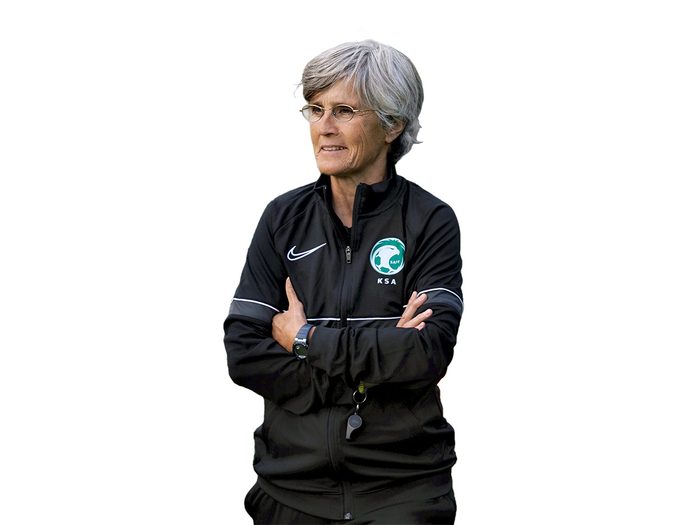
Monika Staab, 64, former coach of Saudi Arabia
In August 2021, Monika Staab was appointed the first ever coach of the new Saudi women’s soccer team. For years the former midfielder has fought for gender equality in soccer in countries around the world. This kingdom in the desert is her latest challenge.
Growing up in the 1960s near Frankfurt, Germany, Staab was a tomboy, playing street soccer with boys from the age of four. There were no girls’ teams; in fact, football for females was banned in Germany until 1970, when, incredibly, at age 11, Staab earned a spot on an adult women’s team. “We couldn’t get a pitch until 9:30 p.m. I wouldn’t get home until 11, and the next morning I’d go to work at 5 at my parents’ bakery. Then I’d go to school at 7.”
At age 18, Staab moved to London to play for Queens Park Rangers, supporting herself by cleaning hotel rooms. (In those days, not only were players not paid by the club, they even had to pay to use the pitch.) After stints with Southampton and Paris Saint-Germain, in 1984 she returned to Germany to play, where not only was she still not paid, she and her teammates frequently endured sexist comments by some of the male players.
Fortunately, attitudes in her home country started to change in 2003, when Germany won the Women’s World Cup. Staab was by then manager of the team now called Eintracht Frankfurt. After steering it to multiple victories, in 2007 she had a new mission: travelling the world to help develop women’s soccer and improve women’s lives. To date, she has run programs in 86 countries.

At a school soccer project in The Gambia, girls who often missed out on an education to help at home started coming back to the classroom. In Cambodia Staab trained female victims of human trafficking. “For an hour or two they could play and forget all their sorrow,” she says. She fervently believes soccer can empower women to become agents of change in society. “Football is more than a game. It teaches you respect, tolerance, fair play, communication, how to work as a team.”
So in 2020, when the Saudi Arabian Football Federation (SAFF) asked Staab to run its first professional coaching course for women, she agreed. Nine months later, she was named manager of the newly created national team.
She has sensed huge enthusiasm for women’s soccer in the kingdom, especially since 2019 when the SAFF created a women’s soccer department, allowing women to play professionally for the first time. She saw men and women watching live soccer matches together and girls being given the right to play sports in school. There are now two women’s domestic leagues involving 25 clubs.
Staab, who lives in Riyadh (she says “training in 40-degree heat keeps you young”), has guided the national team to four victories and two draws in their first seven international matches. In February this year, she was promoted to national technical director, overseeing further development of the female game in the kingdom. (Rosa Lappi-Seppälä, a Finn, is now the team’s coach.)
This spring, plans for Saudi Arabia’s state tourism authority to sponsor this summer’s Women’s World Cup were dropped by FIFA after organizations such as Amnesty International and Human Rights Watch argued Saudi Arabia is using women’s soccer to give gloss to the country’s image and distract from its poor human rights record.
Monika Staab, for her part, stays focused on the game. “I am not the King,” she says. “I am here for women’s football. These girls deserve to play the game as much as men do.”
Here are 10 incredible Canadian women you didn’t learn about in history class.
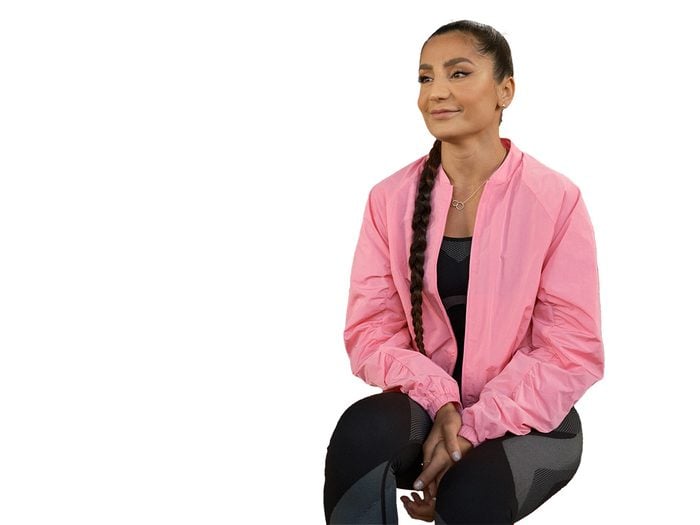
Nadia Nadim, 35, Afghan-born striker for Denmark
Nadia Nadim’s passion for soccer was ignited when, as a child living in a camp for asylum seekers in central Denmark in 2000, she watched other girls through a fence playing at a neighbouring club. “It was the first time I’d seen girls play football,” she remembers. “I loved watching one particular girl and wished it was me. She looked so happy and free.”
Freedom had been in short supply for Nadim’s family in their native Afghanistan after her father, an army general, was murdered by the Taliban. Nadim was the second of five girls, and without a male to accompany them, the family was housebound. “We couldn’t go to school, so our mum taught us at home,” explains Nadim.
Her mother decided to hire people smugglers and flee the country. Armed with fake passports, they made it over the border to Pakistan and flew to Milan. There, they hid in the back of a truck as it rolled for two days across Europe. When they reached the Danish city of Randers, the driver told them it was time to get out.
While living in the refugee camp, Nadim learned Danish in the morning and played soccer every afternoon with boys and girls in the camp until dark. Eventually she plucked up the courage to ask the girls whom she’d been watching through the fence if she could join their club. She played her. first match in a too-small pair of football boots from a second-hand shop; she tried soaking them so they’d stretch, but “I still got blisters,” she recalls.
Nadim’s skills and athleticism soon set her on an incredible soccer career. She became the first foreign-born player to appear for Denmark, at the Algarve Cup in Portugal in 2009. Nadim has played professionally for teams in Denmark and the U.K., and was with the venerable Paris Saint-Germain team that won the French women’s league title in 2021. She currently plays for Racing Louisville FC in the U.S.

In 2006, Nadim started a soccer program with a friend in a deprived area of Randers where young people were often in trouble with the law. The project began with seven boys and grew to include more than 200 kids—boys and girls.
She recalls the day she saw two Somali girls in headscarves playing soccer with the boys. “Until then, the girls didn’t think they could play. I realized football has power. It can change people’s point of view.” Nadim was named UNESCO champion for girls’ and women’s education in 2019.
Giving back is what motivated Nadia Nadim to become a doctor. She juggled playing pro soccer with studying medicine at Aarhus University in Denmark, qualifying as a doctor in 2022.
“I want to be in a position where I can help people when I retire from the game,” she says. “When I walk the corridors of the hospital in my white coat, I get this feeling I can do great things.”
Here are 50 inspirational quotes to live by.
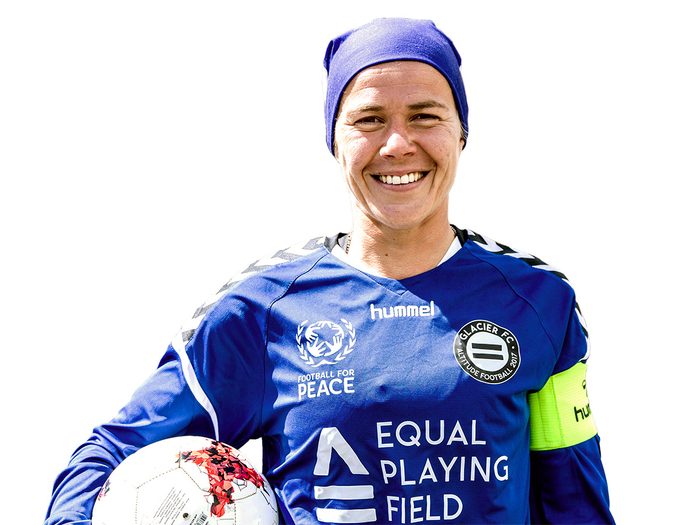
Sandrine Dusang, 39, former player for France and leading equality activist
“What would you really like to do?” Sandrine Dusang’s mother asked her six-year-old daughter, who would cry every time she went to dance class. “I want to play football,” she replied. Soon she was one of very few girls kicking a ball around in her village club near Vichy, France. When Dusang turned 13 and was no longer allowed to play it with boys, her mother drove her three times a week to train with other girls in Moulins an hour away.
In 2003, after graduating from the French national female soccer academy CNFE Clairefontaine, Dusang, a defender, joined France’s high-ranking Olympique Lyonnais Feminin and was selected to play for France (appearing at the 2005 European Cup tournament). But because she earned only a small match fee for each game she played, she had to work as a marketing assistant for the club.
“I’d work all day in the office, grab a snack and my gear, and run to my training session,” she recalls, only too aware it wasn’t the same for the men. French women footballers were finally given contracts in 2009.
Dusang represented France in 47 international matches between 2003 and 2011, but today, she fights for equal opportunities in the game. “Football is a school of life,” she explains. “It can be played anywhere: in your garden, in the road, on a playground. Through football you develop personally. Girls often have to be more assertive to succeed, and football can help with that. It makes us stronger.”

Her activism has taken several forms. She spent four years editing French news site Foot d’Elles, promoting women’s soccer and diversity in sport, and volunteering for Equal Playing Field. It’s an international collective that promotes sports development for women worldwide; it has representation in 32 countries but is based mainly in the U.S. and U.K.
Now, 20 years after starting her pro playing career, Dusang is fighting to get recognition for Corsica’s first exclusively female club. Based in the city of Bastia, on the Mediterranean island that is a region of France, she is both a player and co-president of Féminine Esprit Club (FEC) Bastia. Soon after arriving in Corsica in 2019, she discovered that women’s soccer teams there were allowed to play only in regional competitions, and not against teams from mainland France.
After she lobbied Corsican politicians, her club was included in the nationwide Coupe de France competition in December 2022 (the team had one victory and one loss).
Sandrine Dusang has also used her position at FEC Bastia to convey important messages and values. Players’ shirts carry LGBT colours and a slogan in the Corsican language promoting gender equality. It translates as “Everyone can play.”
These podcasts for women are worth adding to your playlist.
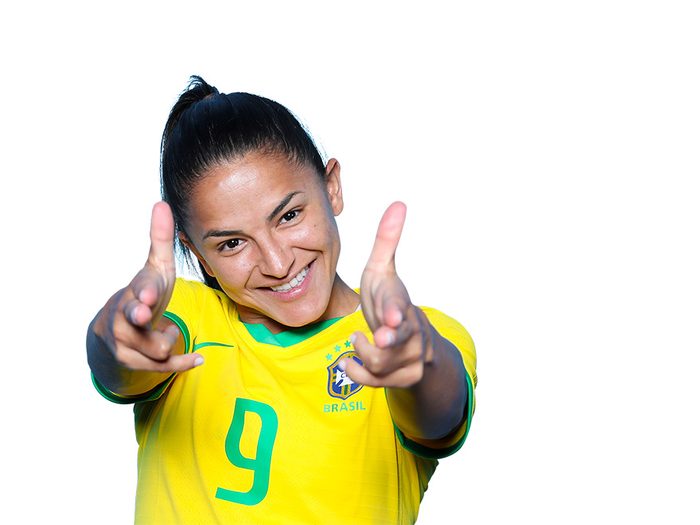
Débora Cristiane de Oliveira (“Debinha”), midfielder for Brazil
Debinha means “little Debs” in Portuguese—she’s 1.57 metres tall—and this star midfielder has no intention of getting too big for her soccer boots. “Never go above someone else,” is her philosophy.
Instead, she says, it’s better to be a mirror for someone else, and to always be learning from your teammates in whatever you choose to do. After all, she says, “I didn’t get here alone.”
She acknowledges the debt she owes to her family and others who’ve helped her make it to the top, but also gives herself credit for her self-belief, her ability to take herself out of her comfort zone and her undying commitment to her sport.
From street soccer in a provincial town in southeast Brazil to one of the stars of the U.S. National Women’s Soccer League and a mainstay of the Brazilian women’s team, Debinha, 31, has come a long way.
She has appeared for her country more than 130 times and in 2022 was shortlisted for the Best FIFA Women’s Player award, the only South American to be nominated. This summer she is packing her kit in preparation for her second World Cup.
“I always liked to play ball,” says Debinha, who first started playing it at age eight in the square outside the candy factory where her mother worked in their home town of Brasópolis. If she wasn’t playing in the street, she was taking extra physical education classes after school.

“I was fascinated by sports, all kinds of sports,” Debinha says. “I played volleyball, handball. I skateboarded. But football was my forte, so I was always doing that with the boys and the girls.”
The de Oliveiras are a close family, but for a while Debinha’s father’s heavy drinking cast a shadow over their home life. Debinha threw herself into football and when a chance came up to try out for Saad, a soccer club on the outskirts of São Paulo more than 200 kilometres away, the 16-year-old went to her mother’s workplace to ask her to sign the consent form. Her mother started to weep.
“It was very hard to see her crying,” says Debinha. Her mother went through a period of depression but always supported her daughter. “Today, as always, she is my number one fan,” says Debinha, who is also very proud of her father for overcoming his alcoholism.
Leaving Brasópolis was as difficult for Debinha as it was for her mother. “To go after my dream, I had to leave my friends, my family, a comfortable life. It was a life where I had always been happy, living on Sete de Setembro Street and playing in the square.”
But the self-confessed “girl who was always driven by challenges” knew she had to do it. And it was worth it. In addition to Brazilian clubs, she has played for teams in Norway and China, and is now with the Kansas City Current in the U.S.
The greatest moment of her career so far has been representing Brazil in the 2016 Olympic Games, when they were held in her home nation.
“To be on the field and see my family cheering for me, to see my family experiencing that along with me, you couldn’t put a price on it.”
Check out more good news stories to brighten your day.